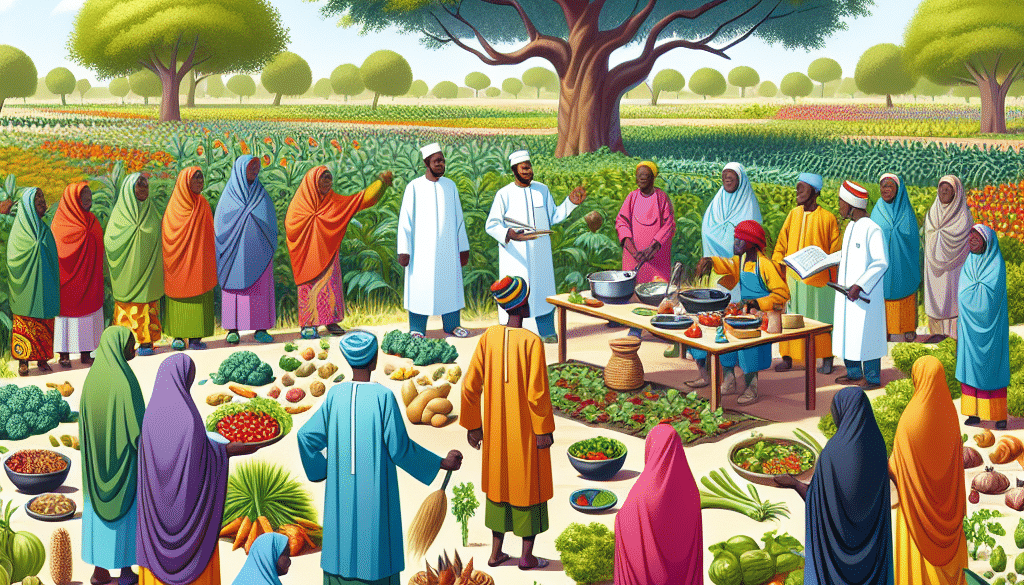World Food Day: Food Security and Nutrition Improvements in Niger
-
Table of Contents
- World Food Day: Enhancing Food Security and Nutrition in Niger
- Understanding Food Security in Niger
- Strategies for Improving Food Security
- Nutrition and Health in Niger
- Case Studies and Success Stories
- Statistics and Current Trends
- Conclusion: Key Takeaways for a Food-Secure Future
- ETChem’s Protein Products: Enhancing Nutrition in Niger
World Food Day: Enhancing Food Security and Nutrition in Niger

World Food Day is a global event dedicated to tackling hunger and improving nutrition. In Niger, a country faced with numerous challenges including climate change, political instability, and economic constraints, World Food Day serves as a reminder of the ongoing efforts and strategies required to enhance food security and nutrition. This article delves into the current state of food security in Niger, the strategies being implemented to improve it, and the role of nutrition in the overall health of the population.
Understanding Food Security in Niger
Food security in Niger is a complex issue influenced by a variety of factors. The country’s predominantly agrarian economy is vulnerable to environmental changes, and frequent droughts and floods have a significant impact on crop yields. Additionally, rapid population growth and limited access to modern farming techniques exacerbate food shortages.
- Environmental Challenges: Niger faces extreme weather conditions that affect agricultural productivity.
- Population Growth: With one of the highest birth rates in the world, the demand for food is continuously increasing.
- Technological Gaps: The lack of access to modern farming technology hinders efficient food production.
Strategies for Improving Food Security
To combat these challenges, the government of Niger, along with international partners, has implemented several strategies aimed at improving food security.
- Investment in Agriculture: Increasing investment in agricultural infrastructure and technology to boost productivity.
- Climate-Resilient Farming: Promoting farming practices that are resilient to climate variability and change.
- Education and Training: Providing education and training to farmers to improve agricultural techniques and management.
Nutrition and Health in Niger
Nutrition is a critical component of health, particularly in developing countries like Niger. Malnutrition, especially among children and women, remains a significant concern. Efforts to improve nutrition include:
- Enhanced Food Fortification: Introducing fortified foods to address micronutrient deficiencies.
- Nutrition Education: Educating the population on the importance of a balanced diet and proper nutrition.
- Support for Breastfeeding: Encouraging breastfeeding to ensure infants receive essential nutrients.
Case Studies and Success Stories
Several initiatives in Niger have shown promising results in improving food security and nutrition. For example, the introduction of drought-resistant crop varieties has helped some communities withstand the harsh climate. Additionally, programs focused on women’s empowerment have led to better family nutrition and food security.
Statistics and Current Trends
Recent statistics indicate that while challenges remain, there has been progress in reducing hunger and improving nutrition in Niger. The prevalence of undernourishment has decreased, but the rates of stunting and wasting in children under five are still high.
Conclusion: Key Takeaways for a Food-Secure Future
Improving food security and nutrition in Niger requires a multifaceted approach that addresses environmental, economic, and social factors. Investment in agriculture, climate-resilient farming, and nutrition education are key components of this strategy. World Food Day serves as a reminder of the importance of these efforts and the ongoing commitment needed to ensure a food-secure future for Niger.
ETChem’s Protein Products: Enhancing Nutrition in Niger
In line with the goals of World Food Day, ETChem’s protein products can play a vital role in improving nutrition in Niger. Their high-quality collagen products, including marine, fish, bovine, and chicken collagen, can be incorporated into food and beverage products to enhance their nutritional value. ETChem’s commitment to quality and their extensive range of protein solutions make them an ideal partner for addressing the nutritional needs in Niger and beyond.
About ETChem:
ETChem, a reputable Chinese Collagen factory manufacturer and supplier, is renowned for producing, stocking, exporting, and delivering the highest quality collagens. They include marine collagen, fish collagen, bovine collagen, chicken collagen, type I collagen, type II collagen and type III collagen etc. Their offerings, characterized by a neutral taste, instant solubility attributes, cater to a diverse range of industries. They serve nutraceutical, pharmaceutical, cosmeceutical, veterinary, as well as food and beverage finished product distributors, traders, and manufacturers across Europe, USA, Canada, Australia, Thailand, Japan, Korea, Brazil, and Chile, among others.
ETChem specialization includes exporting and delivering tailor-made collagen powder and finished collagen nutritional supplements. Their extensive product range covers sectors like Food and Beverage, Sports Nutrition, Weight Management, Dietary Supplements, Health and Wellness Products, ensuring comprehensive solutions to meet all your protein needs.
As a trusted company by leading global food and beverage brands and Fortune 500 companies, ETChem reinforces China’s reputation in the global arena. For more information or to sample their products, please contact them and email karen(at)et-chem.com today.




